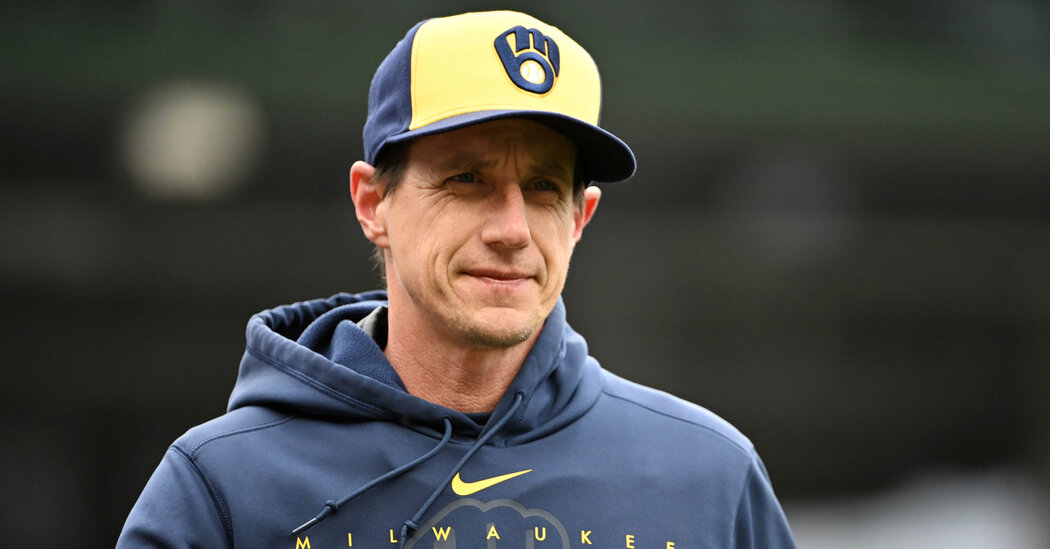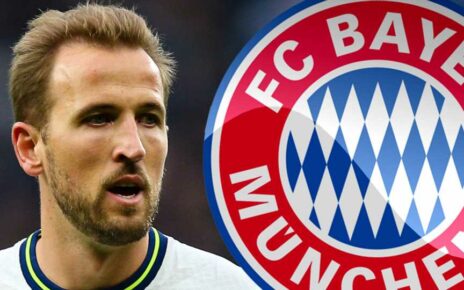The paradox of a life in sports is that the goal cannot really be the goal. If it were — if the only thing that truly mattered was winning a championship — then most people would be miserable. Almost everyone loses in the end.
Craig Counsell has devoted much of his life to the Milwaukee Brewers. As a boy, he helped out at old County Stadium, sorting Robin Yount’s fan mail and operating the speed-pitch booth. In his late 30s and early 40s, he played more than 700 games as a Brewers infielder. On Tuesday, at 52, he will become the franchise leader in games managed, with 1,181.
Yet Counsell’s two World Series rings almost seem to mock such loyalty. He was the starting second baseman for two champions, the 1997 Florida Marlins and the 2001 Arizona Diamondbacks, and holds a singular distinction in baseball history: Counsell is the only player to come to bat in the bottom of the ninth inning of a Game 7 with the winning run on base — twice. Both times, he extended a rally and his teams went on to win.
While the Brewers — born in 1970 (like Counsell) after one season as the Seattle Pilots — have never won a title, the Marlins did it in their fifth seasons and the Diamondbacks in their fourth. How is that fair?
“Considering the Brewers, considering the drought the Cubs had at one point, it’s incredible, right?” Counsell said by phone last week, before a game with the Mets in Milwaukee. “But I don’t look at it like that. I do look at it, like, ‘Man, this would be the best place to do it.’ I do share that and feel that. But I also realize that it’s super, super hard.”
Counsell has learned that lesson in the decades since those charmed early years. He is the dean of National League managers — none of his N.L. peers were with their current teams when Counsell was hired early in the 2015 season — and has led the Brewers to four playoff appearances and a 622-557 record, including this year’s 7-2 start. He has not steered the Brewers to an N.L. pennant, but has accomplished something even more meaningful.
“The No. 1 goal is to really have baseball be relevant here in Wisconsin and Milwaukee,” Counsell said. “Keeping that alive is really what you have to shoot for every day, and the World Series is kind of like a result of all that.”
He added: “I think that’s really important, that we’re putting something on that’s fun to watch. And we do give ourselves a chance — we’ve made some runs, and one of these times it’s going to result in the whole thing. Our job is to just keep doing that. That creates fans, and that creates people passing the sport on generationally.”
Counsell is a second-generation Brewers employee and a second-generation graduate of the University of Notre Dame. His father, John, captained the Notre Dame baseball team in 1964 and later spent a decade as the Brewers’ director of community relations.
What to Know About M.L.B.’s New Rules
All about action. Major League Baseball is implementing some of the biggest changes in the sport’s history in an effort to speed up the game and inject more activity. Here’s a look at some of the new rules taking effect this season:
Pitch clock. The biggest change is the creation of a pitch clock. Pitchers will have 15 seconds to begin their motion with the bases empty and 20 seconds with a runner on. If they don’t, they will be assessed a ball. Batters not in the box by the eight-second mark will receive a strike.
More pace-of-play changes. A pitcher is limited to two disengagements, such as a pickoff attempt or step-off, per plate appearance. A third will result in a balk. There will be a 30-second clock between batters and a 2-minute-15-second inning break during regular-season games.
Defensive shift ban. All four infielders must have both feet on the infield dirt or grass when the pitcher begins his motion, and each team must have two infielders on each side of second base. A violation results in a ball, or the batting team can let the play stand.
Bigger bases. With the goal of decreasing collisions at first base and stimulating more infield hits and stolen bases, all three bases were increased to 18 inches square from 15. That will reduce the distance between first and second base, and second and third, by 4.5 inches.
Why make these changes? Baseball has been criticized for having long games without enough action. In 2021, an average game set a record at 3 hours 11 minutes — the average was 2 hours 44 minutes in 1985. Hits per game were near historic lows while strikeouts were higher than ever.
Will the new rules work? M.L.B. found that the use of a pitch clock in the minors shortened the average game by 25 minutes. Overall, the league saw a slight increase in batting average, a larger one in stolen base attempts, a notable decrease in injuries and a smaller decrease in strikeouts.
That stretch included the Brewers’ only World Series appearance, their 1982 loss to the Cardinals in seven games. It was a wrenching defeat, and while Craig shared in the agony from the stands in St. Louis, he would soon get a vivid example of the joy Milwaukee took from the journey.
“He came home and he saw the parade — and he could not believe the way the city had reacted to losing the World Series,” John Counsell said. “We had a bigger parade than St. Louis had, supposedly. And I think that affected him. He always remembered that.”
Craig was always a keen observer, said John, who considers it his son’s best trait as a manager. When Craig was 12, John asked him which players were his favorites. Craig named the Brewers’ biggest stars, Yount and Paul Molitor, but not just for their talent. He had noticed how they acted when John picked them up for appearances.
“They’re the same at home as they are at the ballpark,” John said Craig told him. “And I said, ‘Holy cow, I’ve got to tell your mom you said that.’ He was figuring this whole thing out about what players were like and what it was like to be a major league player.”
John’s playing career had peaked at Class A, but Craig would spend 16 years in the majors, propelled by four standout seasons under Coach Pat Murphy at Notre Dame. Counsell was Murphy’s first recruit, in the fall of 1987, and nearly three decades later Counsell recruited Murphy as his bench coach with the Brewers.
Murphy has the classic traits of a football coach — intense taskmaster and charismatic back-slapper — while Counsell is a self-effacing nice guy with a sharp, dry wit. It is an unlikely pairing, but one Counsell eagerly sought in 2015, after his first season as manager.
“When Couns hired Murph, they’re so different stylistically that we were all kind of like, ‘Couns did what?’” said Mike Rooney, who played with Counsell at Notre Dame, coached with Murphy at Arizona State and now calls college games for ESPN.
He added: “Not because we don’t think highly of Murph, because we do, but because they’re just so different. And I remember Couns said something like, ‘Why wouldn’t I hire him? He views the world so differently than I do, and that’s exactly what I need.’”
Because of their deep roots, Counsell said, he can disagree with Murphy without taking it personally. It helps both to have a confidant with a different style of communication.
“He’s taught me more about coaching and leadership than you could ever believe,” Murphy said. “He doesn’t sweat any of the small stuff. He knows how to make decisions clearly and concisely, he can stay on point, he doesn’t get too emotional. He’s been a great example for me as a person who loves this profession and feels like it takes years to become good at it. Couns makes it look easy.”
In 2018, when he led the Brewers to the N.L. Championship Series, Counsell had a thin rotation and a deep bullpen; in one N.L.C.S. game, he pulled his starter after one batter. Now, he wins by relying on his ace right-handed starters — Corbin Burnes, Brandon Woodruff and Freddy Peralta — for as long as possible.
“It’s who we have, it’s what they’re good at, and you take advantage of it,” Counsell said.
Last year’s team led the N.L. Central on Aug. 5 but finished second with an 86-76 record, one game behind the Philadelphia Phillies for the final wild-card spot. Eliminated three years in a row in the playoffs by the eventual champions — the Washington Nationals in 2019, the Los Angeles Dodgers in 2020 and the Atlanta Braves in 2021 — the Brewers watched the Phillies romp to the pennant.
“There’s a little bit of a common theme there: If you want to go to the World Series, you play the Brewers,” Woodruff said. “But it feels like if we just keep on trucking along, our time is going to come. Last year stung — it was a punch in the gut, in a way — and coming into this year, Couns really set the tone for us.”
Counsell emphasized connectivity, Woodruff said, playing for your teammates as much as yourselves — standard stuff, perhaps, but a message the clubhouse may have needed. With Burnes and Woodruff eligible for free agency after the 2024 season, this may be the Brewers’ best chance for that elusive title.
This is also Counsell’s last season under contract, and there is value to having an open future. Counsell and his wife, Michelle, have four children, including two aspiring baseball players: one at the University of Minnesota and another with a fall commitment to the University of Michigan. The pull of home could be strong.
Whatever happens, though, Counsell will not go far. He still lives in the Milwaukee County village of Whitefish Bay, where he grew up. And he will always have a deep understanding of the meaning of success, forever the son of the community relations director.
“We’re an entertainment venue for everybody, and to be a place that creates community pride is important,” Counsell said. “I think we’re doing that, and I know that means there’s another generation of baseball fans being created. And that’s a great thing for our area.”
Source: Read Full Article


